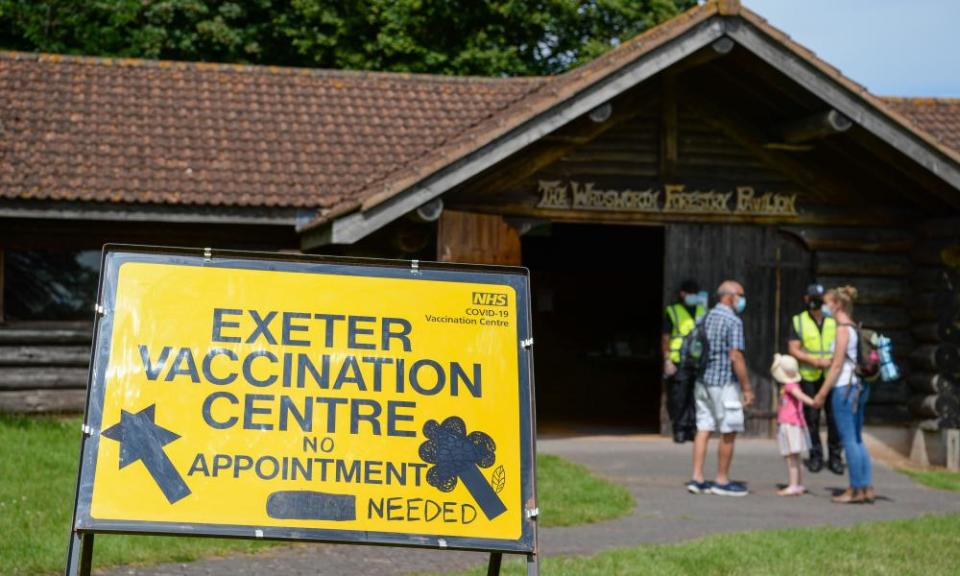Covid vaccine boosters in England: what has changed?

Q: Boris Johnson on Monday announced a major ramping up of the drive to administer booster Covid vaccines in England. What prompted that?
A: The emergence last week of the new variant of coronavirus, named Omicron by the World Health Organization. Ministers, NHS leaders, scientists and doctors fear it could trigger a new wave of Covid-19 infections, which in turn could threaten to overwhelm the NHS.
Q: What has the prime minister promised to do to expand the booster programme?
A: “We’re going to throw everything at it, in order to ensure that everyone eligible is offered that booster in just over two months,” he said. He pledged that every adult in England would be offered their top-up shot by the end of January. That will mean that the NHS and others who are contributing to the delivery of boosters will have to increase the number they do every day from 350,000 to 500,000.
Johnson said that the number of pharmacies providing boosters would go up to more than 1,500, that more hospitals would give out jabs, that temporary vaccination centres would be “popping up like Christmas trees” and that 400 military personnel and a “jabs army” of volunteers would help, too.
Q: How many people have already had first, second and third jabs in England?
A: The latest dataset (pdf – see page 83) on this subject, published last Thursday by the UK Health Security Agency, gives those numbers. They show that millions of people in England remain either partly or wholly unvaccinated.
As of then, 67.4% of everyone from the age of 12 upwards had had at least one dose and 61.5% had had two doses, but only 20.5% had had the first two doses and a booster. Take-up has been much higher in older age groups than younger ones. For example, among 60- to 64-year-olds 90.7% have had at least one dose, 88.7% have had at least two and 35.9% have had both and their extra jab. In the 40- to 45-year-old age group, 76.7% have had at least one dose, 72.9% at least two – but just 8.8% have had their booster.
So with Covid infections persistently high and a new variant to contend with, there is a real urgency to ensure that as many people as possible get their top-up shot.
Q: How many vaccination sites are there in England?
A: As of Wednesday, 2,868 sites were in operation – the largest number ever. Of those, 1,464 are community pharmacies, 1,066 are run by primary care networks – local groupings of GP surgeries – while 230 are hospital hubs and 108 are vaccination centres.
NHS bosses plan to increase that number as soon as possible, pushing the total to more than 3,000.
The biggest expansion is likely to be in community pharmacies. As there are about 11,500 of them in England, and many pharmacists who work in them are keen to help out, that should be easy, pharmacy organisations say. However, the Guardian has been told that pharmacists running vaccination sites are now being urged to persuade colleagues at other pharmacies to set up extra jab centres, to help speed up the booster programme.
“It means the load is not all on GPs, who also have the mammoth task of helping clear the NHS care backlog”, said Andrew Lane, the chair of the National Pharmacy Association. “We are looking forward to being a key element of this new drive, having already vaccinated over 15 million people in earlier phases of the [Covid jabs] programme.”
Q: What advantages do pharmacies offer in helping the booster drive?
A: Thorrun Govind, the chair of the Royal Pharmaceutical Society in England, said: “Pharmacies are currently part of the flu vaccination programme and have skilled vaccinators on site as well as the appropriate storage facilities. Pharmacists are well used to maintaining social distancing and reinforcing mask-wearing during consultations with people.
“Once a pharmacy is set up with adequate staffing they can make a significant contribution to maximising capacity in the NHS vaccination programme.”
But, she added, while ministers are widening the pool of people who can deliver jabs, “this must be backed up on adequate vaccine supplies, a robust booking system and clear communication with the public on when they are eligible to come forward”.
Q: What role will GPs play in what Johnson has called another “great British vaccination effort”?
A: GPs have delivered the bulk of all the almost 116m doses given out over the last year across the UK. Ministers and NHS bosses want them involved in this urgent new phase of the campaign. But GP leaders in England are demanding that ministers remove some or all of the “bureaucratic burdens” on them, especially the requirement – under the Quality Outcomes Framework – to monitor the health of millions of patients with conditions that mean they are at higher risk of having a heart attack or a stroke, such as diabetes and high blood pressure.
Talks were ongoing on Wednesday to try to resolve that issue involving the British Medical Association, NHS England and the Department of Health and Social Care.
Q: Are there enough vaccinators to deliver all these extra jabs?
A: No. But NHS England’s chief executive, Amanda Pritchard, announced on Tuesday that it is going to recruit 10,000 paid vaccinators to help out. In addition, the St John Ambulance and Women’s Royal Voluntary Service plan to jointly recruit another 30,000 vaccinators, though theirs would be volunteers. They will all supplement the tens of thousands of existing vaccinators, though many of them are NHS staff who have other jobs and thus cannot devote all their time to dispensing jabs.

 Yahoo Finance
Yahoo Finance 